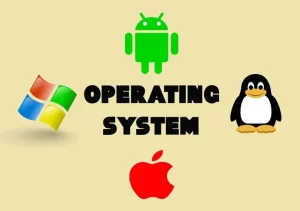Operating system features, types, advantages and disadvantages
The operating system is the most important software that runs on a computer, It manages the computer’s memory and processes, as well as all of its software and hardware, It enables you to communicate with the computer without knowing how to speak the computer’s language, Without an operating system, a computer is useless.
What is an operating system?
The operating system (OS) is the software that acts as an interface between computer hardware components and the user, Every computer system must have at least one operating system to run other programs, applications such as Browsers, MS Office, and Notepad Games, need some environment to run and perform its tasks.
The operating system handles all essential functions, such as handling files, programs, and memory, It serves as the resource manager for all resources, It offers powerful benefits to computer software and software development, Without an operating system, every application would need to include its UI.
The operating system allows computer hardware and software to connect and work together. The kernel is the central component of a computer operating system, The only job performed by the kernel is to manage the communication between the software and the hardware.
Examples of Operating Systems
There are many operating systems examples such as Windows, Android, iOS, Mac OS, Linux, Chrome OS, and Windows Phone OS.
Types of operating systems
There are many types of operating systems such as Batch Operating Systems, Multitasking/Time Sharing OS, Multiprocessing OS, Real-Time OS, Distributed OS, Network OS, and Mobile OS.
The user of a batch operating system never directly interacts with the computer, every user prepares his job on an offline device like a punch card and submits it to the computer operator.
The time-sharing operating system allows people located at different terminals to use a single computer system at the same time, The processor time (CPU) which is shared among multiple users is termed time sharing.
The real-time operating system responds to inputs in a very short time, Military Software Systems and Space Software Systems are Real-time OS examples.
Distributed systems can use many processors located in different machines to offer very fast computation to their users, The Network Operating System can manage data, users, groups, security, applications, and other networking functions, and it runs on a server.
Mobile operating systems are designed to power smartphones, tablets, and wearable devices, The most famous mobile operating systems are Android and iOS, but others include BlackBerry, Web, and watchOS.
Functions of operating systems
- Process management allows the operating system to create and delete processes, It offers mechanisms for synchronization and communication among processes.
- The memory management module performs the task of allocation and de-allocation of memory space to programs in need of these resources.
- File management can manage all file-related activities such as organization storage, retrieval, naming, sharing, and protection of files.
- Device management can keep track of all devices, This module responsible for this task is known as the I/O controller, It performs the task of allocation and de-allocation of the devices.
- Secondary-Storage Management: Systems have many levels of storage which include primary storage, secondary storage, and cache storage, Instructions and data must be stored in primary storage or cache so that a running program can reference it.
- Security module protects the data and information of the computer system against malware threats and authorized access.
- Command interpretation can interpret commands given by the acting system resources to process those commands.
- Networking is a group of processors that do not share memory, hardware devices, or a clock, The processors communicate with one another through the network.
- Job accounting can keep track of time & resources used by various jobs and users.
- Communication management can coordinate and assign compilers, interpreters, and other software resources to various users of the computer systems.
Features of operating systems
The operating system has protected and supervisor mode, It allows disk access and file systems, It supports program execution, It supports memory management, It supports handling I/O operations, It supports manipulation of the file system, It supports error detection and handling, It supports resource allocation, It supports information and resource protection.
Advantages of Operating System
The operating System allows you to hide details of hardware by creating an abstraction, It is easy to use with a GUI, It offers an environment in which a user may execute programs/applications, It makes sure that the computer system is convenient to use, It acts as an intermediary among applications and the hardware components, It provides the computer system resources with easy to use format, It acts as an intermediator between all hardware and software of the system.
On the computer, there is a lot of user data that can only be accessed with the help of an operating system, Apart from storing and accessing data, the operating system handles data safely and securely, Windows Defender finds and eliminates dangerous and harmful files in Microsoft Windows, It also protects your information by encrypting it bit by bit.
Windows operating system includes GUI (Graphical User Interface), which made using computers far more natural than the previous Command Line Interface, users can swiftly comprehend, interact with, and communicate with computers. Operating systems allow users to access hardware without writing programs, thanks to the GUI.
The operating system is a software program, It allows users to enter data, process it, and view the results, Users can conduct various operations such as arithmetic calculations and other essential tasks. Printers, modems, players, and fax machines are all used to share data and important information with other users, a single user can send emails to many users at the same time to share the same info, You can transfer applications, photos, and media items from your PC to other devices.
The operating system can manage multiple tasks at the same time, It needs to be updated to keep up with the rapidly changing features, OS must increase benchmarks and handle all aspects of computer operation as other programs and software receive upgrades to improve their usefulness, An operating system can be updated without difficulty.
The interaction between users and equipment is provided by the operating system since it provides multiple menus, catches, symbols, and more for a simple route, the operating system allows for a user-friendly and intuitive graphic user interface for all customers.
The operating system is responsible for controlling all PC capabilities, Working with a GUI does not require any specialized skills, Memory division, paging, and trading are some of the techniques used by O/S, The Operating System aids in the management of all data and output devices within the PC structure.
The operating system assists in converting all projects into executable directions and is responsible for synchronizing all cycles, Working systems can deal with a variety of interfering factors, For organizing the entire cycle in the CPU for execution, The operating system implements a variety of booking schemes.
The operating system helps to compress surrounding discontinuities, It is responsible for distributing all information within the framework, It grants permission to request paging, It is not necessary to fracture it, It helps in the effective planning of all pages, It allows you to send a single piece of information to several clients, It can share resources such as printers, fax machines, etc.
It can be refreshed at any moment, It offers an adjustable interface for introducing and running a wide range of games and programming, Some operating systems, such as Windows, include protection against malicious files and infections.
Disadvantages of operating systems
When the central operating system fails, the entire system will fail, and the machine will stop working, the computer system can’t work without an operating system, all communication will be disrupted, and no further data processing will be possible.
Some operating systems are more expensive than open-source platforms like Linux, While free operating systems are available, they are often more difficult to operate than others, and operating systems with GUI functionality and other built-in features, such as Microsoft Windows, are expensive.
Operating systems are extremely complicated, and the language used to create them is not well-defined, if there is an issue with the OS that users do not understand, it cannot be fixed quickly. Operating system threats are worse since they are more vulnerable to viral attacks, Many users install malicious software packages on their computers, which causes the operating system to stop working and slow down.
When stored memory in a computer splits, it is known as fragmentation, When the technique of processing is larger than the memory size, internal fragmentation develops, When the method or process is eliminated, external fragmentation happens.
The operating system has increased memory access times for things like page table queries, TLB (Translation Lookaside Buffer) usage has to be improved, and Protected page tables are required, More memory is required for the memory board, and Inner fracture is required.
The virtual memory size must be connected to the PTLR (Page Table Length Register), Staggered page tables and varying page sizes require more improvement, Even without your permission, unauthorized clients can use your system when the functioning framework fails, your data will be erased from the operating system, Given that any risk might be implanted at any time, providing complete protection from all viruses is a very difficult task.
When any issue occurs in OS, you will lose all the contents that have been stored in your system, The operating system’s software is quite expensive for small-sized organizations which adds a burden on them, It is never entirely secure as a threat can occur at any time.
You can follow science online on YouTube from this link: Science online
You can download Science online application on Google Play from this link: Science online Apps on Google Play
Linux Operating System advantages, disadvantages & features
Microsoft Windows advantages and disadvantages
Macintosh operating system advantages and disadvantages
Microsoft .Net Framework applications, advantages and disadvantages
Windows Phone features, advantages & disadvantages, Is Windows Phone better than Android?




